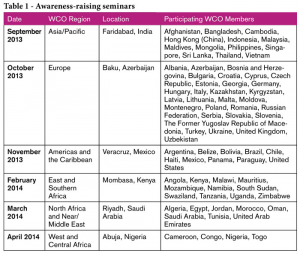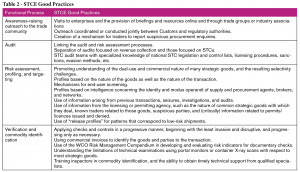Strategic Trade Control Enforcement Project: a new component of the WCO Compliance and Enforcement Package
31 October 2023
One year ago, the WCO Secretariat launched a Strategic Trade Control Enforcement (STCE) Project as directed by the WCO Enforcement Committee and in response to calls for technical assistance from WCO Members. The Project’s anniversary marks a good opportunity to take stock of what has been accomplished so far, and what remains to be done.
Strategic goods are defined as weapons of mass destruction (WMD), conventional weapons, and related items involved in the development, production or use of such weapons and their delivery systems.
Another notable anniversary this year is that of United Nations Security Council Resolution 1540 (UNSCR 1540), adopted 10 years ago to prevent illicit trafficking and smuggling of WMD and related items. With its focus on the need to develop and maintain appropriate and effective border, export, transit and transhipment controls, implementation of UNSCR 1540 depends on Customs.
Background
Despite the importance of combatting illicit trafficking in strategic commodities, this is a particularly challenging topic for Customs. At the 31st Session of the Enforcement Committee, in March 2012, several WCO Members took the floor and outlined the challenges they faced in relation to enforcing strategic trade controls (STCs).
The WCO Secretariat was encouraged to explore ways of supporting WCO Members in this context, and a few months later the Organization hosted its first STCE Conference in Brussels. Over 190 participants from 90 countries attended the event and called for more technical assistance in this field. Their call led to the launch of the STCE Project in March 2013, with three key lines of activity to be completed by June 2015:
- organization of awareness-raising seminars;
- production of a comprehensive STCE training curriculum for Customs;
- execution of a global STC law-enforcement operation.
In the first year of this truly global project, a great deal has been accomplished already.
Awareness-raising seminars
Six regional awareness-raising seminars were conducted during the first year of the Project, as summarized below:

These seminars served as a forum for WCO Members to discuss in detail the implementation challenges that they face and also to share good practices some administrations have developed to tackle the challenges. Following these seminars, over 130 representatives from over 85 Customs administrations and several international organizations attended the second WCO Global Seminar on STCE that took place from 8-10 April 2014.
The second Conference continued discussions begun in November 2012 during the WCO’s first STCE event, building upon the understandings developed through the regional seminars and the curriculum development effort to identify lessons learned, the further raising of awareness about strategic trade controls, and the beginning of initiatives to coordinate enforcement at borders.
Key identified challenges
The first observation to be made from these discussions is that the challenges to effective enforcement of strategic trade controls can be divided into two main categories: those that can only be addressed by senior managers and policy officials, and those that can be addressed at the operational level.
Until the high-level issues are dealt with, little can be accomplished at the working level. As a result, the WCO Secretary General has asked Directors General of Customs to give this matter their highest possible support within their administrations.
The principal high-level challenges identified include:
- ensuring a high-level policy commitment to the security mission and adequate resources for STCE;
- identifying the legal and regulatory basis for STCE, including penalties sufficient to deter non-compliance, including forfeiture of goods, fines, criminal prosecution, and loss of export privileges;
- creating mechanisms for coordination and information-sharing with regulatory, investigative, and intelligence agencies;
- creating mechanisms for Customs-business engagement;
- promoting the use of risk management principles;
- creating training programmes to raise the awareness of frontline officers and providing them with timely technical support;
- addressing challenges of inspector liability and seized property disposition.
Good practices
At the working level, the following good practices have been identified:

Implementation guidance
As part of the STCE Project, the WCO has drafted a comprehensive STCE Implementation Guide to assist WCO Members in developing, reviewing, and implementing their STCE processes and procedures and to provide a framework for the curriculum to be developed along those lines.
This Implementation Guide was unanimously endorsed by the most recent Session of the Enforcement Committee in March 2014. It is currently available to all WCO Members via the Customs Learning & Knowledge Community (CLiKC!) STCE Portal, and will soon be made available on the WCO Website.
The Implementation Guide is divided into two principal sections, one for senior Customs managers and policy officials, and the other for operational Customs officers:
- the section for senior managers discusses the importance of STCs, the role of Customs, and how to establish STCE procedures and processes as well as how to create conditions for their success;
- the section for operational Customs officers discusses techniques used to carry out the major functions that comprise the overall STC process and several related activities.
Of importance is the Annex to the Implementation Guide. It contains profiles of many strategic goods, and is organized following the chapters of the Harmonized System (HS) to provide a reference on strategic goods from a Customs perspective.
Next steps
Now that the awareness-raising seminars and the Implementation Guide are complete, the STCE Project will focus for the next year on developing the curriculum and enhancing global operational cooperation in STCE matters.
Given the fact that the Project has focused unprecedented attention and importance on STCE implementation by Customs administrations and promoted global coordination of their efforts, it already can be considered a success.
The global Customs community is truly rising to the need to play a central role in ensuring supply chain transparency and implementing the border-related parts of relevant internationally-binding agreements and commitments.
More information
enforcement@wcoomd.org
